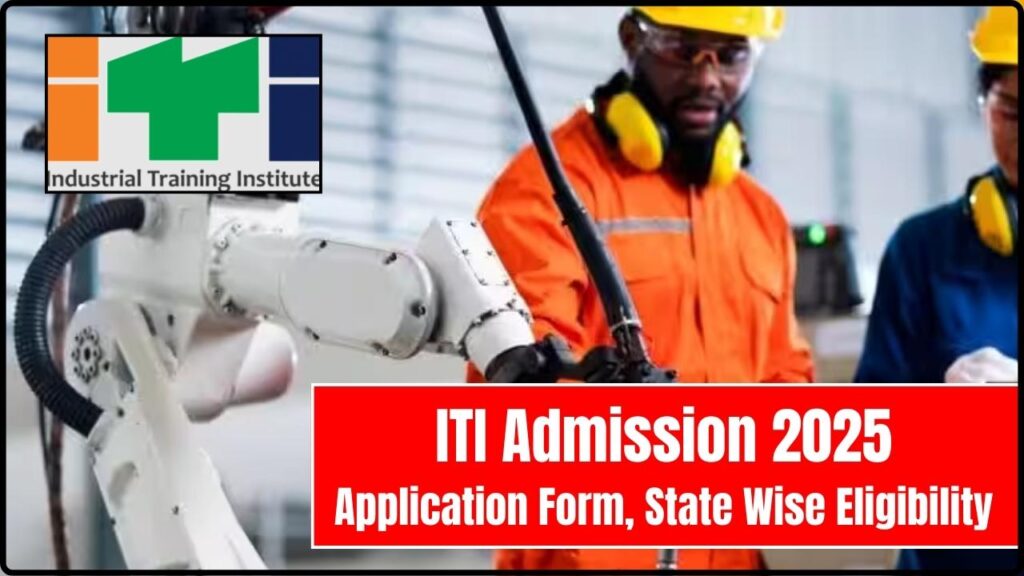ITI Admission 2025 – Application Form State Wise, Eligibility, Fees, Selection Process
ITI Admission 2025: The ITI Admission 2025 process has officially commenced across various states in India, unlocking a valuable pathway for students aiming to acquire hands-on, industry-relevant training. Industrial Training Institutes (ITIs) are crucial in bridging the skill gap between formal education and workforce demands, particularly in sectors that rely heavily on practical expertise.
As the Indian economy pivots towards skill-intensive growth, ITIs are becoming increasingly popular among youth who prefer learning by doing. Whether you’re interested in working with machines, coding computers, managing office work, or even sewing garments, there’s a trade available at ITIs to match your passion and future goals. This detailed guide explores the complete admission process, eligibility requirements, fee structure, trade options, and more.

ITI Admission 2025
| Feature | Details |
|---|---|
| Exam Name | ITI Admission 2025 |
| Conducting Bodies | State Directorate of Training/State Council for Vocational Training (SCVT) |
| Eligibility | Minimum Class 8 or Class 10 (varies by trade and state) |
| Minimum Age | 14 years (no upper age limit in most cases) |
| Application Mode | Online via state-specific portals |
| Admission Criteria | Merit-based or Entrance exam (state-dependent) |
| Course Duration | 6 months to 2 years |
| Fee Range | ₹1,000 to ₹10,000 per year (varies by state/institute) |
| Official Portals | Varies by state (e.g., https://admissions.itiharyana.gov.in) |
ITI Admission 2025 offers a golden opportunity for students looking to gain job-oriented education with minimum investment and time. As the government pushes forward with initiatives like Skill India, Make in India, and Digital India, ITI certifications are becoming more valuable than ever.
Whether you aim to get a government job, start your own business, or work in the private sector, ITI can be the first major step toward that goal. Apply early, stay informed via your state’s official portal, and embark on a future that is both skilled and secure.
What Is ITI and Why Should You Consider It?
Industrial Training Institutes (ITIs) operate under the Ministry of Skill Development and Entrepreneurship (MSDE) and offer short-term, vocational education programs. They serve as an ideal platform for those who wish to gain job-ready skills in a short time span without entering traditional degree programs.
Key Advantages of ITI Courses:
- Quick Employability: Most courses lead to jobs within 6–24 months
- Affordable Education: Cost-effective, with scholarships and fee waivers for eligible students
- Skill-Based Curriculum: Trade-specific practical training
- Wide Recognition: Certification is valid across India and internationally
- Flexible Entry Points: Open to students from Class 8, 10, or 12 backgrounds
- Entrepreneurship: Encourages self-employment and skill-based startups
Popular Trades Offered at ITIs
Technical Trades:
- Electrician
- Fitter
- Plumber
- Mechanic (Motor Vehicle / Diesel / Refrigeration)
- Welder
- Turner
Non-Technical Trades:
- COPA (Computer Operator and Programming Assistant)
- Stenography (English/Hindi)
- Sewing Technology
- Dress Designing
- Office Assistant
- Health Sanitary Inspector
🛠️ Each trade is designed to fulfill specific skill requirements in core industries such as automotive, construction, electricals, IT, and textiles.
Application Process for ITI Admission 2025
- Visit the State-Specific ITI Portal: Select your state’s official ITI portal to access the application form. Some popular portals include,
- Uttar Pradesh: https://www.scvtup.in
- Haryana: https://admissions.itiharyana.gov.in
- Delhi: https://itidelhi.admissions.nic.in
- Maharashtra: https://admission.dvet.gov.in
- Complete Registration:
- Create a login ID using your mobile number and email
- Provide details such as name, gender, Aadhaar number, DOB
- Choose a secure password for your account
- Fill Out the Application Form:
- Enter academic qualifications
- Choose preferred trades and institutions
- Upload scanned documents (photo, signature, mark sheets)
- Pay the Application Fee:
- General category: ₹100–₹250
- SC/ST/PwD: Often free or discounted
- Payment modes: Net banking, UPI, Debit/Credit Card
- Submit & Save:
- Review the form for accuracy
- Submit and download the confirmation page for reference
- Track application status via portal login
Missing a step or document may delay your application or lead to rejection. Double-check all uploads before submission.
Detailed Eligibility Criteria
| Requirement | Description |
|---|---|
| Educational Qualification | Minimum Class 8 for some trades; Class 10 or 12 for others |
| Minimum Age | 14 years as on 1st August 2025 |
| Maximum Age | No upper limit in most states |
| Domicile Requirement | Must be a resident of the applying state (state quota rules apply) |
| Medical Certificate | Mandatory for physically demanding trades |
Candidates applying for advanced trades like IT or engineering-based trades may need to fulfill additional prerequisites like mathematics or science subjects.
Course Duration and Fee Structure by Trade Type
| Trade Category | Typical Duration | Government ITI Fees | Private ITI Fees |
|---|---|---|---|
| Engineering Trades | 1 to 2 years (2–4 semesters) | ₹2,000 – ₹6,000 per year | ₹15,000 – ₹50,000+ per year |
| Non-Engineering | 6 months to 1 year | ₹1,000 – ₹4,000 per year | ₹10,000 – ₹30,000 per year |
Note: Fee waivers are often available for SC/ST/OBC/EWS candidates. States may also offer stipends for girls and economically disadvantaged applicants.
State-Wise Admission Portals (Expanded)
| State | Application Link |
|---|---|
| Uttar Pradesh | https://www.scvtup.in |
| Haryana | https://admissions.itiharyana.gov.in |
| Delhi | https://itidelhi.admissions.nic.in |
| Maharashtra | https://admission.dvet.gov.in |
| Rajasthan | http://hteapp.hte.rajasthan.gov.in/iti_admission |
| Bihar | https://www.bceceboard.bihar.gov.in |
| West Bengal | https://scvtwb.in |
| Tamil Nadu | https://skilltraining.tn.gov.in |
Admission Process and Selection Criteria
Merit-Based Admission
- Most states publish a merit list based on Class 8, 10, or 12 marks.
- Separate lists for reserved categories, girls, and PwD candidates.
Entrance-Based Admission
- States like Bihar may conduct ITI entrance exams.
- Admission is granted based on rank and preference.
Counseling Rounds
- Online counseling sessions
- Choice filling and preference locking
- Final seat allotment followed by document verification
List of Essential Documents
Before applying, make sure the following documents are ready:
- Class 8/10/12 mark sheets
- Birth certificate
- Domicile certificate
- Aadhaar card or other ID proof
- Passport-size photos
- Category certificate (SC/ST/OBC/EWS)
- Income certificate (if seeking scholarship)
- Medical fitness certificate
RMPSSU Admission 2025: Check How to get admission in Raja Mahendra Pratap Singh State University
Raja Mahendra Pratap Singh State University: rmpssu Admission, Exam, Result, Cut Off and Latest News
TANCET 2025 Result Coming Soon – Check Expected Qualifying Marks
Career Scope and Pathways After ITI
Completing an ITI course opens the door to a wide range of career paths:
Employment:
- Government jobs (Railways, Indian Navy, DRDO, CPWD)
- Private sector (manufacturing, IT, construction, electronics)
- PSU hiring through exams (e.g., BHEL, ONGC, NTPC)
Higher Studies:
- Diploma in engineering (lateral entry)
- Short-term skill certifications from NSDC/Skill India
Entrepreneurship:
- Start your own workshop or service center
- Freelancing in IT trades (e.g., COPA)
- Contractual projects in construction or fabrication
ITI courses are increasingly aligned with India’s National Education Policy (NEP 2020), which emphasizes vocational training.
FAQs On ITI Admission 2025
Q1. Can I apply to more than one trade?
A: Yes, you can apply for multiple trades but will be allotted only one based on merit and availability.
Q2. What’s the difference between NCVT and SCVT?
A: NCVT is a national-level certification, while SCVT is state-specific. Both are recognized, but NCVT is more widely accepted.
Q3. Are ITI courses valid abroad?
A: Yes, especially NCVT-certified trades have value internationally in sectors like construction, hospitality, and mechanics.
Q4. Do ITI students get hostel facilities?
A: Some government ITIs offer hostels, especially in rural areas or for female students.
Q5. What is the salary after completing an ITI course?
A: Entry-level salaries range from ₹10,000 to ₹20,000/month. With experience and specialization, it can rise significantly.








